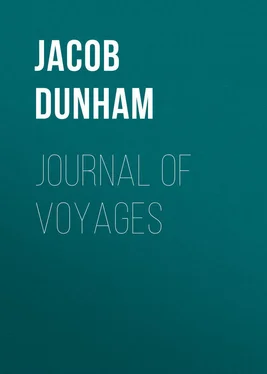Jacob Dunham - Journal of Voyages
Здесь есть возможность читать онлайн «Jacob Dunham - Journal of Voyages» — ознакомительный отрывок электронной книги совершенно бесплатно, а после прочтения отрывка купить полную версию. В некоторых случаях можно слушать аудио, скачать через торрент в формате fb2 и присутствует краткое содержание. Жанр: foreign_antique, foreign_prose, на английском языке. Описание произведения, (предисловие) а так же отзывы посетителей доступны на портале библиотеки ЛибКат.
- Название:Journal of Voyages
- Автор:
- Жанр:
- Год:неизвестен
- ISBN:нет данных
- Рейтинг книги:3 / 5. Голосов: 1
-
Избранное:Добавить в избранное
- Отзывы:
-
Ваша оценка:
- 60
- 1
- 2
- 3
- 4
- 5
Journal of Voyages: краткое содержание, описание и аннотация
Предлагаем к чтению аннотацию, описание, краткое содержание или предисловие (зависит от того, что написал сам автор книги «Journal of Voyages»). Если вы не нашли необходимую информацию о книге — напишите в комментариях, мы постараемся отыскать её.
Journal of Voyages — читать онлайн ознакомительный отрывок
Ниже представлен текст книги, разбитый по страницам. Система сохранения места последней прочитанной страницы, позволяет с удобством читать онлайн бесплатно книгу «Journal of Voyages», без необходимости каждый раз заново искать на чём Вы остановились. Поставьте закладку, и сможете в любой момент перейти на страницу, на которой закончили чтение.
Интервал:
Закладка:
Here I ascertained that my pilot, whom I had taken much pains to obtain, and who at the time I employed him had informed me he was well acquainted with that coast, had deceived me; he now for the first time informed me that he knew nothing of the different shoals and inlets on the Southern coast. I had now no alternative but to run by chance and keep a sharp look out for breakers. My little sloop was literally buried under water. The gale kept increasing until near night, when she struck upon a shoal. She thumped terribly, and almost every sea was breaking entirely over us when a seaman exclaimed, "She is bilged, a plank has come up from her bottom." On examination we found it was the shoe of her keel. We tried the pump and found we could keep her free of water by pretty hard labor. Soon after, she thumped over the shoal into nine feet water, where she did not strike so often, and remained there until dawn. At daylight we cast out the anchors and succeeded in getting her into three or four fathoms water.
We then commenced repairing damages in the best manner we could. Her false keel had been broken and had swung across her main keel, which we could not repair. We then made sail for Chesapeake Bay and arrived that day about sun-set, without any material mishap.
Soon after, a light easterly wind sprung up, and we made sail for Norfolk. After entering the bay the wind slackened. About 11 o'clock in the evening it became a dead calm, with a thick fog: a strong tide set in, which prevented my going out to sea again. Soon after midnight we heard the cry, "Past 2 o'clock, and all's well," which I afterwards ascertained proceeded from His Britanic Majesty's ship Dragon, 74 guns, commanded by Commodore Barry, lying at anchor in the bay.
We continued drifting into the bay until about sunrise, when a light breeze sprung up and dispersed the fog, and we found ourselves drifting directly towards an English 20 gun brig called the Sophia, and the Acton of 16 guns, both lying at anchor within a mile of us. We were soon boarded from the Sophia, and we and our baggage taken on board of her. The brigs then got under weigh and proceeded up the bay, taking my sloop in tow, and anchored at the mouth of the river Severn.
During the next night they fitted out an expedition of four or five boats, and sent them up the river to cut out two or three of our vessels which were lying in the harbor, but they soon returned without accomplishing their design, having only obtained a quantity of plunder. They told me the inhabitants gave them a warm reception, by firing from behind trees and fences, and caused them to abandon the vessels. They weighed anchor the next morning, and after cruising about the bay, again took their station near Watt's Island. Here they made their rendezvous for some time; the officers occasionally going on shore, some days cruising about, and returning to the usual anchorage at night. They procured an abundance of cattle, sheep and poultry from the Island, and in about nine or ten days captured eight old schooners loaded with flour, from the Rappahannock, and bound to the Eastern markets. They sailed from there and anchored in Lynn Haven Bay, where we were sent on board the commodore's ship Dragon. I found twelve American captains prisoners on board the commodore's ship, who had been captured by the Squadron. The prizes which they had taken were small old vessels, some of which they stripped of their rigging and sails and set on fire; some parted their cables in a gale of wind and drifted to sea, my vessel among them. But my sloop, the New-York, and one or two others were afterwards towed back by the frigate and sent to Bermuda.
The American captains were quartered with the petty officers, such as midshipmen, captain's clerks, &c. and were treated with gin, segars, &c. and passed their time very jovially in telling stories, bragging of our naval engagements, &c. I must here tell a story related to me by one of the officers of the Dragon.
He said the Americans ought to be damned if they did not make an admiral of one Captain Turner, who commanded a Baltimore schooner. He said that while they were blockading the coast of France they captured him and his schooner; they put a prize-master and crew on board, and the crew of the schooner were put on board the Squadron, except Captain Turner and the cook, who remained on the schooner, which was ordered to sail for England. The next day Turner succeeded in getting the prize-master and crew drunk, killed the prize-master and part of the crew, and confined the remainder. He then returned to France with his vessel, shipped a new crew, and put to sea again. One morning they discovered from the Squadron, a schooner in company with two frigates, being between the schooner and the land. The Dragon steered directly for the schooner, while the frigates steered in different directions, to prevent the schooner from going back again into port. The Dragon by setting all her light sails was fast coming up with her, and commenced firing her bow guns, to which the schooner paid no attention. They soon came within musket-shot and fired a number of volleys which riddled the schooner's sails. The captain of the Dragon then gave orders to cease firing, as he considered it cold-blooded murder. On coming within a few rods of the schooner they saw but one man on board, and standing at the wheel. When within a short distance he suddenly put down her helm, which brought her broad side across the ship's bow, intending that the ship should run over her. But the ship's helm was immediately put up, which caused her to strike the schooner near the bow and brought her alongside of the ship. They then hailed, "What schooner is that?" To which the man at the helm replied, "The Prize, Captain Turner, the very man you are looking for." On boarding the schooner, they found the crew all below, except the captain, who said he did not wish to expose his crew to their fire. He said the excitement was great on board the ship: that all the officers signed a petition to mitigate Turner's punishment.
While we were lying in Lynn Haven Bay, the Dragon had captured a small vessel, put on board of her a cannonade or short nine-pounder, a quantity of small arms, and called her the "Snap Dragon." They sent her out in pursuit of plunder and slaves, about one hundred and fifty of whom were captured as runaways from their masters. But on one of the expeditions of the Snap Dragon, she was captured by the Americans, having thirty men on board, and the prisoners sent to Baltimore. Soon after an exchange was agreed upon by which the prisoners of the Snap Dragon were exchanged for the Americans on board the ship. When the crew of the Snap Dragon were brought on board the ship we were all discharged, which caused no little rejoicing among us. We then returned to Baltimore, took leave of each other and made our way to our respective homes.
CHAPTER III.
Sloop Biddle
Soon after my unfortunate adventure in the New-York, I took command of a schooner called the Caty Ann, and made a voyage to Savannah and back to New-York, without capture. Although Sir James Yeo, in the South Hampton frigate, was closely blockading Savannah at the time, I made a second attempt to proceed to the same port. After sailing a few miles south of Sandy Hook light-house we were chased back by an English frigate, and the schooner narrowly escaped being captured. The whole coast was so closely blockaded that I abandoned going to sea again until after peace was proclaimed.
About the first of May, 1813, I took charge of the brig Cyrus, of New-York, and made one voyage to Georgetown, South Carolina, and back, and then made another to Bermuda and Turk's Island.
Ever ready to sacrifice my personal comfort for the prospect of increasing the means of gaining an honest living – being in the prime of life and enjoying good health, and that huge monster, Fear, seldom throwing his dark shadow across my path – I engaged again to open a trade with the Indians on the Musquito Shore, on the borders of South America, now called New Greneda, or Central America. This country formerly belonged to the government of Spain, which still tried to exercise authority over it, although rebellions had broken out both in the North and South of it; and, the then called government of Columbia, under General Bolivar, aided by a number of Americans and others, with vessels commissioned as privateers, and land forces, made a strong resistance to the Spanish government. They fought many desperate battles with the royalists, under what was then called the Patriot, or Columbian flag. Carthagena, their largest sea-port, was taken and re-taken three several times, and every man in it put to death.
Читать дальшеИнтервал:
Закладка:
Похожие книги на «Journal of Voyages»
Представляем Вашему вниманию похожие книги на «Journal of Voyages» списком для выбора. Мы отобрали схожую по названию и смыслу литературу в надежде предоставить читателям больше вариантов отыскать новые, интересные, ещё непрочитанные произведения.
Обсуждение, отзывы о книге «Journal of Voyages» и просто собственные мнения читателей. Оставьте ваши комментарии, напишите, что Вы думаете о произведении, его смысле или главных героях. Укажите что конкретно понравилось, а что нет, и почему Вы так считаете.












